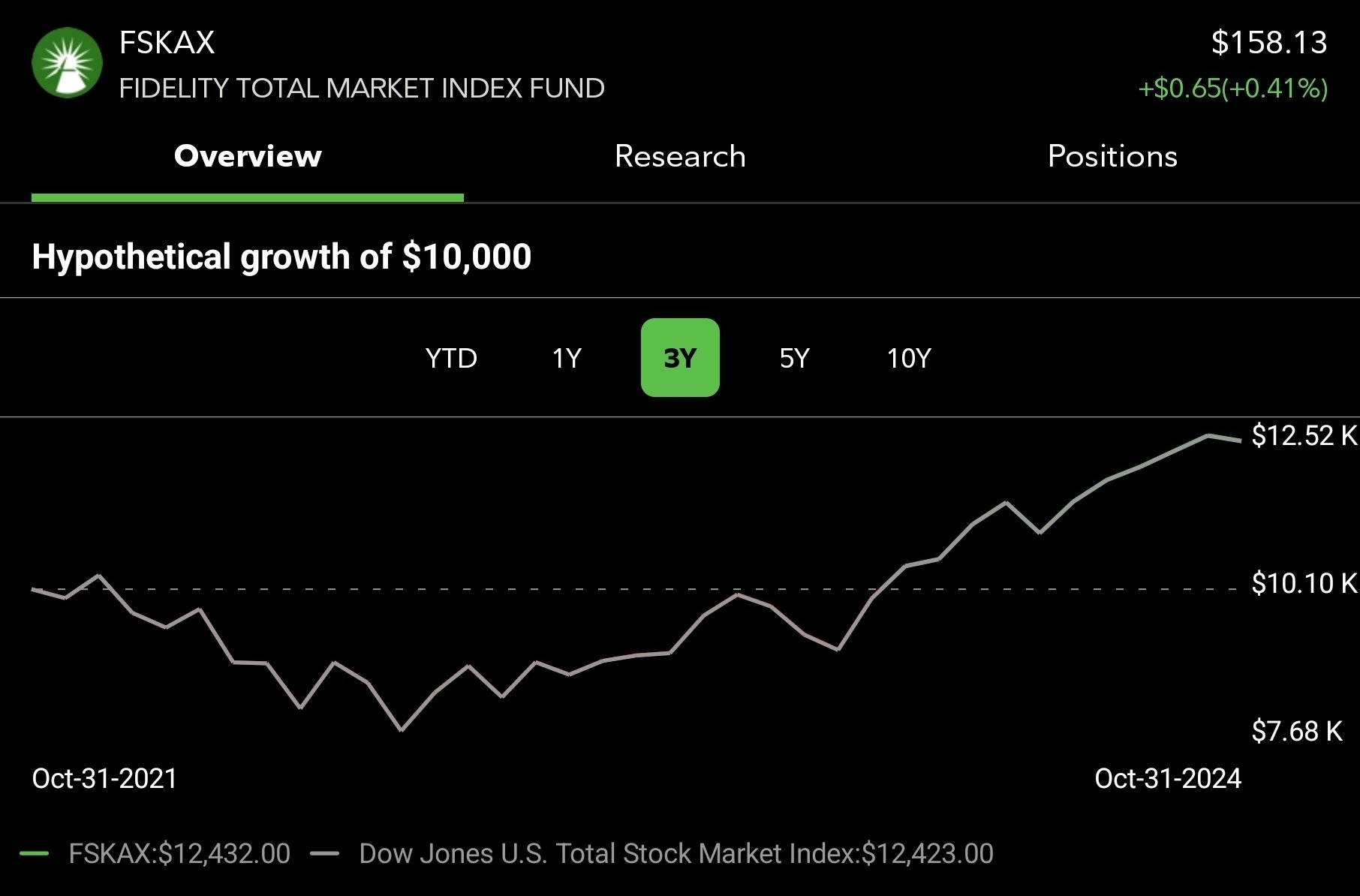My retirement fund that I just started was worth $15k in December of 2021. Then, May of 2022, our area was hit really hard. My retirement plan went down to $7k. Today, it’s worth $11k. I lost $4k on my retirement plan. It’s invested in total market funds, some tech, some big cap companies, and healthcare. But every sector has been ravaged by the stock market changes.
What this graph looks like to me is you made a really shitty bet, lost a bunch, sold at the bottom and then bought index funds and it’s been ticking up since.
Also you didn’t “lose” anything, assuming you didn’t sell. If this is a retirement plan, just keep your head on straight and stick with indexed and dividend funds
You need to talk to someone about your risk tolerance. Clearly you’re not willing to accept short term losses and you’re going to be prone to panic selling and holding cash when you could be buying dips. Your risk tolerance does not match your portfolio.
Tech is a wild ride.
Index funds are boring but not stable.
S&P 500 is always a good bet.
What kind of fees are you paying? That chart does not reflect the market. For instance, if you had invested in a low management fee S&P 500 index find you would expect to have seen a 50% increase over the same period.

Dude isn’t in index funds…nuff said. Mine has more than doubled since 2021
Check the vanguard target retirement income fund (vtinx) and other similar funds. There was a dip in 2021 that absolutely destroyed a number of retirements, my patents included, despite being low risk options. Total bond index funds also suffered for some reason, and those are as low risk as you can get. Every other fund I have is doing great, but the ones that are supposed to be safe are not doing great.
That drop was when the Fed was raising interest rates to stall inflation. Interest rates up, bond values down. But the drop in VTINX was only 20% over all of 2022, where OP is showing 50% in maybe the first quarter.
Incidentally, the sensitivity to interest rates is why I don’t like bond funds. If you buy actual bonds, you get the face value back at maturity, where bond fund are forced to mark them all to current market prices to calculate NAV. IMO, this negates the main “safe” factor in holding bonds.
Good point.
I like to go a step further and do a target-date retirement fund. I think Vanguard funds are based on index funds, but they will reduce how aggressively they invest as you approach your retirement date. And the fees are very low.
If you’re really hands off these are a good choice. But if you are willing to rebalance a couple of times a year, it’s unnecessary to pay the extra fees associated with these funds.
I do like the automatic set it and forget it. Especially with scheduling transfers into investment accounts. I could probably get into rebalancing short-term, but I think long-term I would get bored and forget.
Yeah it’s not for everyone, but I just have an event on my calendar for every six months, and I just rebalance when it goes off. Only takes a short while, especially if you are using some tool that will tell you what your weights are.
Any tools you recommend? Also, how sure are you that the cost savings actually make it worth the effort? My gross expense ratio is 0.08% (I think I’m looking at the right number?)
The close to retirement ones suffered that year. The 2030 target lost 25% in less than a year recently and hasn’t recovered. Ironically, the high risk ones have been less risky during COVID than the low risk ones.
Interesting. I’m targeting 2065 retirement, so I’ve got a long time. But I guess that fund could suffer from the same issue? Or maybe I should assume the same fate based on past events.
Not sure. I’m guessing interest rate stuff will mess with anything with bond holdings, so that probably had stuff to do with it. Other than that… I don’t know if I can convey a big enough shrug in text form.
Not saying that’s not frustrating, but don’t fixate too much on the ups and downs of it if you’re not set to retire soon. What the stock market is doing now is barely going to impact the value of your retirement fund in 20, 30, etc years.
The OP is missing something. The two specific funds of his 5 holdings that he said he bought are both up. The 3 he didn’t provide specifics are up too.
$15k should be all in Vanguard total market index. Smaller funds are riskier and could take decades to show their greater returns.
Retiring on $15k is a scary fucking thought.
$11k
Even scarier.
$7K a year ago
Also, if they are look at the ups and downs, hopefully they invested when it hit the dip.
I lost $4k on my retirement plan. It’s invested in total market funds, some tech, some big cap companies, and healthcare. But every sector has been ravaged by the stock market changes.
Its not your total market fund killing you, its your individual stocks. I don’t recommend picking specific stocks for your real savings. Save individual stock picks for money you can afford to lose. In your case it cost you $7,000.
I used your same data and here’s what it would have looked like if all of it was in your Total Market fund.

You would have $18,679. This would have been a gain of $3479 or a 22% return on investment in only 2 years. That is crazy good! Retirement isn’t a total scam, but unless you are VERY lucky, picking individual stocks is risky. You can successfully save for retirement with just one, two, or three funds: Total Stock Market fund, Total Bond Fund, and perhaps an International fund. I mainly focus on just the boring Total Stock Market fund and it performs fairly consistently well over time.
EDIT: Just to underscore retirement is possible with saving and investing with boring Total Market investment, if 20 years ago you had that same $15,200 and invested it in a boring Total Market investment and never save another penny, today it would be worth $88,982.

I’m not saying that you can go back in time, but with 20 years of growth (very typical for retirement savings) it can really grow. The best time to plant a tree is 20 years ago. The second best time is right now.
This this this. Op is a shit investor using his 401k to buy individual stocks.
Tldr; he’s doing it wrong.
Stop. The Vanguard retirement funds all did this if the target is before 2060. And those are invested in index funds by professionals. OP likely had the VTINX or a total bond fund, both of which did this that year and were recommended for during retirement. This is likely the more liquid portion of the portfolio, not the penny stock portion.
My Vanguard roth IRA is up 11% since 2020, and is up 30% just this last year. If you are investing into individual stocks yourself I would probably reconsider that strategy. Buying individual stocks is closer to gambling than investing.
I see you did total market funds now, idk what to tell you. But if you are not retiring soon it doesn’t really matter. Time in the market is better than timing the market.
Yeah idk what they’re doing, it sucks but relatively compared to a full retirement fund this seems more like a lesson than devastation. My retirement is up, and I have a modest risk portfolio. I don’t know what they set as their risk level (if it’s even managed tbh), but the market has generally grown since 2021. The only thing that makes sense with that is individual stocks, and there’s no way my retirement would ever run on individual stocks.
Look at Tesla, 4 years ago everyone said they were stable and a great way to grow money. Now they’re floundering in the EV market now that there’s a ton of competition. You just can’t predict stocks over the course of a retirement. You can predict the market, and essentially the only market bet we make with our retirement is that it will hopefully grow over the next 30 years
They likely were using a full retirement fund, like VTINX or Vanguard Target 2030 or something like that. All of them tanked in the end of 2021 up to target 2060. Even my shares in the Total Bond Index tanked then, and those are supposed to be as low risk as possible, literally.
My brother or sister, invest in index funds, not the stock market. And then forget about it for 30 years or more until you retire. And then, if you invest in index funds, there will be ups and downs.
The trick is to stay the course because it has been proven that the price will always go up from when you started investing. And then, in 30 years or more, you will have a substantial amount of money for retirement.
*Index funds with low management fees
broad market Index fund with low management fees
My brother or sister, invest in index funds, not the stock market.
I mean, while I get what you’re saying and don’t disagree, I’d phrase it as “hold an index fund rather than stock in individual companies”. ETFs themselves are traded on the stock market.
You’re right. I wrote it quickly while on the go.
I wrote this quickly while going on the toilet. Just thought I’d share.
I hope you had a good sense of euphoria after that.
You can also do target date funds. Each one indicates the projected year you expect to retire. As you get older, it shifts more to safer investments like bonds. The idea is invest in the stock market when you are young and don’t expect to use the money soon. You are able to hold through downturns in the market and returns have historically always trended up despite the occasional drops. When you are near retirement and expect to be using the money you can’t always afford to wait it out so you should invest in things that are more stable but have lower returns like bonds. Target dates have slightly higher fees and you should always check what the fees are before you invest, but they are very set it and forget it.
All target date funds through vanguard tanked that year unless you have 2060 or later as the target. 2030 lost 25% and hasn’t yet recovered.
Sp500 vanguard, if you dont do options. Lowest fees.
The stock market averages are only true if you look at it for a really long time, like 30-40 years. In 10 years, the value can definitely go down a lot, but if you view it for the long-term, it will still be an improvement.
I understand that looking at it like that is unnerving though.
Needing to choose when to retire based on whether the stock market is up or down is a dogshit system.
That’s generally why when you’re younger people tend to put their retirement funds into riskier investments and over time as you get closer to retirement you move portions of your money into less risky things that don’t have the potential volatility of the stock market so that by the time you retire you don’t have to worry about the stock market dipping and blowing out your retirement funds. At least that’s one way to do it; obviously this isn’t investment advice and you should seek your own professional investment advice.
401k is the just liquidity for billionaires, some plebs benefiting from it is an unintended consequence and owners are working pretty hard to ensure it doesnt happent too often.
You don’t have to choose, just keep saving and investing for 30 years.
So if the market crashes the year before I want to retire I should just put off retiring for another 30 years.
Like one of the other replies mentioned, when you get closer to retirement, more of the money should get shifted from stocks to more stable but lower return investments like bonds and such that are not affected by a stock market crash. Usually you can set a retirement age in the management portal of your 401k and the management company in charge of your 401k uses it as a guide to move the money into the more stable investments.
Only 32% of people have 401k accounts.
Only 32% of people have 401k accounts.
45% of 18-29 year olds have a retirement account. That number keeps rising to 77% of people 60+ having a retirement account. source
You don’t need a 401k account to save for retirement. You can do this same savings/investing in an IRA or even an brokerage account (but you wouldn’t get the tax benefits). There are ZERO employer requirements to opening an IRA, you just have to be someone that earns money.
you just have to be someone that earns money.
Earns enough money to set some aside for retirement.
No. If you’ve been saving for 30 years, then you’ll have 30 years of accumulated 10±20% annual gains, which should be something like 16x your start, but could be 100x if you’re lucky or 1x if you’re not. Regardless, an historic crash on retirement day may take that down to 12x your start, which is still pretty good, and will be fixed by the following couple years.
You should have a nest egg by then that even in a crash, a year of withdrawal isn’t significant
I’ll let the vast majority of Americans who can’t afford to save up a nest egg because of wealth inequality that they are doing it wrong.
Also the ones who choose to retire because of medical issues who have to spend any money not in a retirement account before insurance pays out that they did it right, but they are fucked anyway.
The system is shit even if there are ways for the well off to work around it.
So if the market crashes the year before I want to retire I should just put off retiring for another 30 years.
Thats not how to do it. As you approach retirement age (5 to 10 years out), you move your money out of riskier (but higher return generating) stocks and into safer (but lower performing) investments like bonds or even cash (actual cash, CDs, Tbills, etc). Generally you also don’t move it ALL out of riskier stock. You don’t need 100% of your savings on day 1 of retirement, so you convert a few years worth (5 maybe?) to safe stuff and let the riskier stuff ride usually gaining more value even after you retire.
I don’t see what’s so difficult to understand. If you can’t retire at 60, try again at 90. At 120, you really should consider an alternative. If you have to wait until 150, retirement will likely be a lower-priority issue. \s
I’m in a Vanguard target fund and I’m up 7.8% over the same period. There was a lot of red until December 2023, when it broke even. All gains are pretty much from this year looking at my returns chart.
 The 2030 target fund is still down 8.8% since that date.
The 2030 target fund is still down 8.8% since that date.Yeah there is something else going here. No domestic markets are actually down in this interval. OP must have bought some individual stocks.
Or be invested in managed funds with high fees that are performing poorly vs index funds. My 403b is definitely up over this same period, but I’m only in index funds
Yeah, this is FSKAX over 3 years. I have a lot of my portfolio in it and it does well. It’s up 24% over that period.

Which funds did you invest into? I’ve studied like 25 hours of investing. Haven’t found a good fund yet except FSKAX and VTI
Haven’t found a good fund yet except FSKAX and VTI
You found the good ones. No need to go looking further.
I’m in BTC S&P 500 Index, BTC Russell 2500, BTC ACWI EX US IMI, and BTC US Debt and am at 11.93%, 3.6%, 3.87%, and -1.34% over the last 3 years. Over the last year though, it’s 36.36%, 26.36%, 25.22%, and 11.6%. My funds are Large Cap Blend, Small Cap Blend, Foreign Blend, and US Bonds at roughly 67/7/20/6 percent division of my portfolio.
I think you just got into the market at the height of the markets during COVID and are still digging your way back out. You could try diversifying a little bit in a similar fashion to spread the gains and losses out a bit over both large and small US companies and foreign markets.
I’ve put my ira into FNILX. Zero fees and consistently beats 10%
If you have an account with Fidelity, FZROX should be a better choice than VTI. Unless you enjoy investing or want to really get into it, either do a target date fund for the easiest and lowest risk, or a total market fund like VTI, or an S&P500 fund like VOO. You really don’t need to overcomplicate beyond that, except to potentially start buying bonds when you are nearing retirement if you didn’t choose a target date fund.
I recommend FSKAX over FZROX. There are few minor differences. Yes FZROX has a lower expense ratio, but it BARELY lower when compared to FSKAX. My understanding is the biggest downside to FZROX is that you can’t hold that in any other brokerage. So if one day you decide you don’t like Fidelity you have to sell all your FZROX and then buy something else offered at the other brokerage. In a retirement fund this isn’t so much a big deal, but could mean you miss out on gains between the sale and the purchase of whatever else you replace it with.
If you’re investing in a non-retirement account this is a BIG deal, as any gains would be taxed at the time of sale. This can mean you pay 15%-20% on the gains just to switch brokerages. FSKAX doesn’t have that limitation, and you’d be able to simply do an “in kind” transfer of the securities to your new brokerage without any tax events/consequences. To me, that portability is worth the tiny different in expense ratio.
That is the downside, FZROX is only available to Fidelity customers. There’s also a potential risk it won’t track total market performance as well as predicted because one of the ways they keep the expense ratio at zero is by only purchasing what is supposed to be an equivalent subset of the total market to keep their transaction costs down. I don’t remember the specifics but I think they leave out lots of tiny companies and its not a significant risk because they couldn’t actually move the needle one way or the other.
Mainly VFFVX, which is up 4.46% over a 3 year period, but I have about 20% in various other funds.
I let my bank’s financial advisor handle that. They have apps that calculate everything.
They do. And you can generally trust banks to try and sell you what’s most profitable to them.
They are fiduciaries.
Fiduciary is a legally defined term. Fiduciaries are expected to exercise a duty of care and a duty of loyalty to clients, and as a result, are “held to the highest standard of conduct.” Fiduciaries have a bond of trust with another person (called the beneficiary or principal) and have a legal obligation to act for the beneficiary’s benefit – not their own.
That’s all fine, but just be sure you know how much you’re paying them for that service. Before we switched to self-managed a number of years ago our guys were taking 1.4% off the top of the whole account just to pick a bunch of index ETFs. Market goes up 5% and I only see 3.6% of it. Not good. Plus the ETFs they picked had higher expenses than just going with a whole market choice.
They offered to get us on a plan at 1%. Ha, no thanks.
Yeah that’s bad. We’re with JP Morgan through our local Chase branch and their fee when all is said and done is averaged down to less than 1% of the total account balance.
Are you not adding to it steadily?
Average index funds over the long term mathematically prove you wrong. Short term anecdotes don’t disprove 50-70 years of proof.
If your portfolio is down that much over that period of time, you are likely not making good investment choices. S&P500 is up like 50% since 2021…
Your losses or lack of portfolio growth isn’t really something to complain about online without more info on what your asset mix is. Unless your goal was just to complain, and not get any advice from helpful anons that are having more success in investment choices.
It’s invested in total market funds, some tech, some big cap companies, and healthcare
Tech, big cap, and healthcare are already part of the total market funds, so you’re over-weighting (taking excess risk) by investing that way. Assuming you’re pretty young based on time in market, you’d be fine with just the total market fund, until you have more experience with the market or just want a set and forget, for a while.
My retirement account has roughly doubled between Dec 2021 and now, I basically only invest in mutual funds and ETFs with a medium risk, low fees, and high return according to Morningstar ratings (I’m not sure how reliable those metrics are but it’s what shows up when browsing funds on fidelity and it seems to be picking good options so far)
What specifically are you invested in? That chart doesn’t look right if you are investing as you describe.
One thing to consider. When the stocks that are part of a mutual fund drop… then your retirement contributions will be buying them on sale.
Assuming the mutual funds are spread out to minimize risk (1 of the funds companies folds, etc) overall you’ll be better off long term.
As you age you’ll start moving your investments to more stable options (talk to a financial adviser on the specifics for your plans). This way they that won’t benefit from huge gains but also are a lot less likely to be wiped out by massive drops.
In the meantime look at how your funds are doing over time. Not even year to year but maybe every 2 or 3 years.













